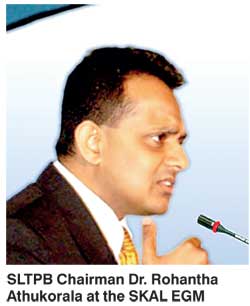Thursday Feb 26, 2026
Thursday Feb 26, 2026
Tuesday, 4 August 2015 01:25 - - {{hitsCtrl.values.hits}}
Whilst the Sri Lanka tourism industry can be proud of the first half year performance of 2015 at a 14.3% growth crossing the 830,000 visitor arrival mark at a revenue growth of $1.3 billion, the Sri Lanka Tourism Promotions Bureau Chairman Dr. Rohantha Athukorala stated that Sri Lanka must stop chasing visitor arrival numbers but focus on attracting $ 250 per day guests into the country in order to make the industry financially viable.
Delivering the keynote address at the SKAL EGM at the Galadari Hotel, he further stated that revenue growth being flat in the formal  sector was worrying given that the Central Bank confirms tourism receipts at 14% growth.
sector was worrying given that the Central Bank confirms tourism receipts at 14% growth.
SKAL was founded in 1932 in Paris by travel managers and the idea of international goodwill and friendship grew and, in 1934, the “Association Internationale des Skål Clubs” was formed with Florimond Volckaert as its first President, who is considered the “Father of Skål”. Today, the organisation has earned itself a reputation as the ‘voice of the tourism industry’ and in Sri Lanka attracts the best names of the sector, making it a key stakeholder in the industry under the leadership of Dushy Perera.
Dr. Athukorala’s logic of targeting the minimum threshold traveller of $250 was that given the high cost of construction and labour in Sri Lanka, unless we have a hotel property that can attract a $ 250 tourist, it will not be financial viable. If not the owner will have to wait for asset enhancement alone which is not a strong business model that can be marketed for a potential investor, he commented.
“Whilst we can do all the focussed B2B marketing on a private-public partnership for us to attract a $ 250 tourist, Sri Lanka needs a strong brand building communication campaign targeting UK/Europe travellers who net in 22% of the net proceeds whilst though the Asian travellers account for a higher footfall due to India and China, the revenue to the country is only 13% which clearly justifies the argument for the core markers to be Europe. The sad story is that for the last three years we have neglected the Western markets by pumping in a colossal Rs.860 million to China alone which needs to be balanced if we are to make the industry financially attractive,” said Dr Athukorala, who also has experience of serving the 12 billion dollar Export Development Board and the Sri Lanka Tea Board for the last five years, which gives him an insight to the cross-sectoral policy issues the country needs to address.
"The travel and tourism industry is going through radical change and unless we adjust we will perish. The formal sector being flat on growth in Q1 whilst tourist receipts up 14% are indications of the reform required on policy and private sector business model"
The reason for the informal sector booming was the online travel agencies driving growth, explained the Chairman. “A typical dot com has over 4,000 entities in the list whist at SLTDA we have around 1,200 registered, which explains the gap on the number of arrivals. We don’t have to go far; even in the formal sector online booking was just 4-5% around four years back and today it has shot to as high as 40%, which means the business model has to change. The industry is going through radical change and now the industry has to align. We cannot change the game, we have to now do reforms on policy and as a business model,” said Athukorala.
Whilst commending SKAL members for the strong private-public sector partnership on below-the-line marketing strategies, he urged the industry to focus on strategically positioning the country with brand equity developing initiatives and be vocal in an appropriate manner post 17 August so that policymakers give priority to this issue and the radical changes that are required in the industry.
“The good news is that the top eight global advertising agencies have expressed their interest in the global tourism tender pitch. We must now get things firmed up for a quick launch globally,” said Athukorala.